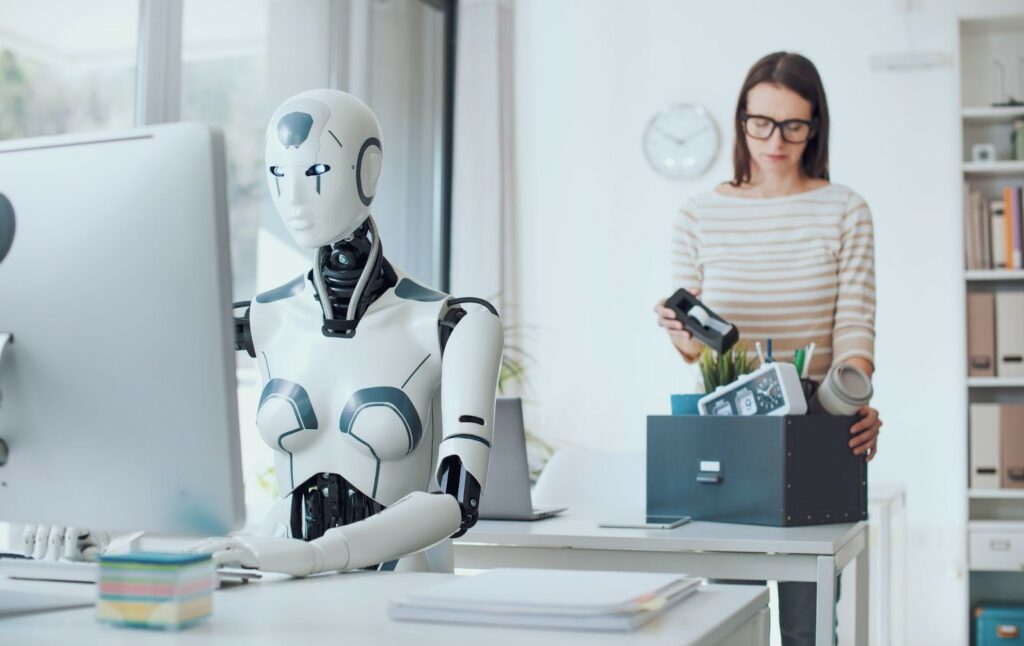Have you ever felt a twinge of worry deep down when pondering the question “Will AI replace humans?”
It’s natural to feel a sense of unease, perhaps even a touch of anxiety that can keep you up at night, as we see AI taking big leaps in reshaping our world.
The creeping fear, the uncertainty about what the future holds, and the thought that you can really lose your job are the feelings almost everybody is dealing with currently.
But take a deep breath. There’s nothing to fear, not just yet. Let’s embark on this journey together and confront all our fears head-on.
Let’s deeply understand what AI is and how it can impact our lives.
What is Artificial Intelligence?

When you hear the term artificial intelligence (AI), you might picture self-driving cars, robots, AI chatbots like ChatGPT, or computer-generated images. However, it’s worth taking a closer look and truly understanding the inner workings of AI and how it impacts our current and upcoming generations.
AI is the ability of machines to handle tasks that once required human intelligence. This concept has been in play since the 1950s, and it’s continually evolving, shaping our world in fascinating ways. This definition has evolved over the years alongside technological advancements.
When we talk about bestowing intelligence upon a machine, like a computer, it’s crucial to start by defining what we mean by ‘intelligence.’ This helps us assess whether an artificial system truly exhibits intelligence. Today’s AI systems do showcase certain elements of human intelligence, including the ability to learn, solve problems, and perceive information.
Advantages of Artificial Intelligence
- Minimization of Human Errors
Artificial Intelligence (AI) offers a substantial advantage by minimizing errors and enhancing accuracy and precision. AI-driven decision-making relies on a combination of previously collected information and well-defined algorithms.
When meticulously programmed, these systems can virtually eliminate errors.
Example: AI-driven software in word processors and messaging apps can automatically detect and correct grammar and spelling errors. This assists users in producing error-free written content without the need for extensive proofreading, making communication clearer and more accurate.
- Elimination of Risks
One major advantage of AI is it can handle risky tasks that can be dangerous to humans. Whether it’s dealing with explosive devices, venturing into space, or delving into the depths of the ocean, machines built with robust materials naturally resist dangers and can thrive in hostile environments.
Furthermore, they deliver precise results with heightened responsibility and endurance.
Example: AI’s contribution to safety is evident in autonomous vehicles. Self-driving cars equipped with AI systems can navigate roads while monitoring their surroundings. They detect potential dangers, make split-second decisions, and react to prevent accidents. This technology reduces the risk of human errors on the road.
- Continuous Availability Round the Clock
While humans need regular breaks and time off to ensure a healthy work-life balance, AI systems can operate continuously without the need for such pauses.
Example: In manufacturing industries, AI-driven robotic systems can operate without the need for periodic breaks. These robots use AI algorithms to perform tasks such as assembling products, quality control inspections, and even complex, high-precision operations like welding or soldering.
They can work tirelessly, maintaining consistent productivity and precision throughout their operational hours, significantly contributing to efficient production processes.
- Digital Assistance
Numerous highly tech-savvy companies leverage digital assistants as a means of interacting with users, thereby reducing reliance on human staff. Many websites employ digital chatbots to provide users with requested information, allowing for conversational interactions. Certain chatbots are made so well that it can be hard to tell if we’re talking to a person or a robot.
Example: Schools and universities traditionally rely on administrative staff to handle inquiries from students and parents. However, educational institutions can implement AI-driven chatbots to address a wide range of queries.
These chatbots can provide information about admission procedures, course details, academic schedules and even offer guidance on various student services, streamlining the communication process.
- Impartial Judgement
Emotions inevitably influence humans, while AI remains emotionally neutral and consistently practical in its decision-making approach. One of the significant benefits of AI lies in its impartiality, which results in more precise decision-making.
Example: AI-powered content recommendation algorithms used by streaming platforms like Netflix. These algorithms analyze a user’s viewing history, preferences, and behavior to suggest movies and shows. These recommendations are solely based on data and user behavior, eliminating potential biases related to factors like race, gender, or age.
- New Inventions
AI is leading the charge in pushing innovation across nearly every sector, providing answers to a vast array of intricate challenges.
Example: Recent developments in AI technology have empowered healthcare professionals to identify breast cancer in women at earlier stages of development.
- Identifying Patterns and Trends
Artificial Intelligence (AI) has a remarkable ability to excel in pattern recognition. This means it can analyze large sets of data and uncover intricate trends and similarities that might not be obvious to humans. Imagine it as a detective of information, sifting through vast amounts of data to find hidden clues.
Example: AI acts as your shopping assistant when you browse online stores. It analyzes your preferences, past purchases, and what shoppers similar to you are buying. Then, it presents you with tailored product recommendations, making your online shopping experience smoother and more enjoyable.
- Faster Decision-making
AI offers the advantage of expediting decision-making processes. Through task automation and the provision of instant insights, AI can assist organizations in reaching quicker and well-informed decisions.
This becomes especially advantageous in scenarios of significant consequence, where swift and precise decisions are imperative to avert costly mistakes or preserve lives.
Example: In healthcare, AI can assist radiologists by quickly analyzing medical images such as X-rays or MRIs. AI algorithms can rapidly detect abnormalities or patterns in these images, allowing for faster and more accurate diagnoses.
This speeds up the diagnostic process and helps healthcare professionals make more timely treatment decisions for patients.
Let’s now explore the primary drawbacks associated with Artificial Intelligence.
Disadvantages of AI
- High Costs
Creating AI systems that mimic human intelligence is a complex and expensive endeavor. These systems require substantial time, resources, and continuous updates, adding to the financial burden.
- Lack of Creativity
AI lacks the ability to think creatively. While it can learn from data and experiences, it cannot innovate or think outside the box like humans can.
- Makes Humans Lazy
AI’s automation of repetitive tasks may lead to reduced mental engagement, potentially making people reliant on AI for problem-solving and decision-making.
- Ethical Concerns
AI lacks ethics and morality, raising concerns about its uncontrolled growth and potential consequences, commonly referred to as the “AI singularity.”
- Emotionless
Unlike humans, AI lacks emotions and the ability to form genuine human connections, which are vital for effective teamwork.
- Limited Self-Improvement
AI operates based on pre-programmed knowledge and cannot independently improve or adapt. Human intervention is necessary to make changes or enhancements to AI systems.
So, these were some of the pros and cons of Artificial Intelligence. Now, let’s understand the nature of its competitor, “Human Intelligence.”
What is Human Intelligence?

Human intelligence is the brain’s extraordinary software, allowing us to binge-learn from life’s Netflix of experiences, upgrade our knowledge, and craft ingenious solutions for the ultimate survival series called life.
Human intelligence can be really helpful in many ways. It can tell us about things that happened, like when travelers or refugees share their stories. Also, it can give us really good information about things someone knows a lot about, even if it’s secret, like when spies or defectors tell us confidential information.
Lastly, it can shed light on interpersonal connections and networks of interest.
Advantages of Human Intelligence
- Wisdom and Accumulated Expertise
There’s no substitute for the satisfaction of acquiring insights from another person’s life experience and their wealth of knowledge, a benefit exclusively attributed to human intelligence.
- Creativity and Uniqueness
Human thinking, understanding, and generating data through thorough research bring forth creative ideas and unique perspectives, providing valuable insights and viewpoints.
- Innovative Ideas
The human mind’s prowess is unparalleled, capable of crafting fresh, imaginative ideas and innovative solutions by leveraging current information and understanding.
- Communication
Engaging in human interaction enables conversation and the exchange of answers to your queries, offering a sense of connection and comprehension imbued with a personal touch.
- Sentimental Driven
Humans excel at crafting content that leverages emotional appeal, enabling more profound and impactful communication.
Disadvantages of Human Intelligence
- Limited Working Memory
Humans possess a limited ability to keep and manage information in their minds. This constraint can make it challenging to perform tasks that involve doing multiple things simultaneously or handling large amounts of data at once.
- Emotional Influences
Emotions have the power to empower the decision-making process. Humans prioritize emotions over purely rational analysis, which can, at times, result in outcomes that may not align with our optimal choices.
- Limited Information Processing Speed
Human brains have a limited processing speed compared to computers. This can affect the speed at which complex calculations or data analysis tasks are performed.
- Difficulty with Complex Abstractions
Some concepts and abstractions, especially those in advanced mathematics or theoretical physics, can be extremely challenging for many individuals to understand and work with.
- Cultural and Environmental Influence
Human intelligence is shaped by cultural and environmental factors. Different cultures may have different perspectives and knowledge, which can limit the universality of human intelligence.
- Limited Learning Capacity
Human beings possess the remarkable ability to acquire new knowledge and adapt to varying circumstances throughout their lives. This natural ability to learn helps people broaden their knowledge and improve their skills over time.
But there’s a definite cap on how much information and skills a person can actually learn and remember that learning during their lifetime.
Now, let’s take a look at the table below to get a clearer idea of the distinctions between AI and Human intelligence.
Artificial Intelligence vs. Human Intelligence: A Comparative Overview

| Parameters | Artificial Intelligence | Human Intelligence |
| Functionality | AI-powered machines function on the basis of input of data and instructions provided to them. The input is in the form of algorithms or programming. | Individuals employ the memory, processing capacity, and cognitive abilities offered by their brains. |
| Pace of Operation | Unlike humans, computers can quickly handle huge amounts of data. For instance, if a person takes hours to organize a massive database by hand, AI algorithms can do the same job in just seconds. | In terms of speed, humans are no match for artificial intelligence and robots. |
| Learning Ability | Machines can’t think in abstract ways or learn from their past experiences like humans do. While they can get smarter from data and practice, machines will never think as deeply as humans do. | Humans unique knack for acquiring knowledge and skills from life experiences, enabling us to adapt, remember, problem-solve, and apply our understanding effectively. |
| Determining the Best Course of Action | AI’s decision-making process is inherently objective, grounded in its thorough analysis of meticulously collected data. | Human decision-making often involves subjective elements that extend beyond mere numerical considerations. |
| Supremacy in outcomes | In human insights, the presence of “human error” is common, as certain subtle details can occasionally be overlooked. | AI’s consistent accuracy is due to its reliance on adaptable guidelines that can be modified as necessary for improvement. |
| Multi-tasking | AI can handle fewer tasks simultaneously because it can only learn tasks one at a time within a system. | Human multitasking abilities are evident in their capacity to carry out various diverse roles concurrently. |
| Social Interaction | AI hasn’t fully mastered the skill of recognizing important social and emotional cues. | Conversely, as social beings, humans excel in social interaction due to their ability to process abstract information, possess self-awareness and show sensitivity to the emotions of others. |
| Creative Undertaking | It optimizes systems but can’t be creative or innovative like humans, as machines lack that capability. | Humans can be creative and innovative with their tasks. |
Now that we’ve explored both AI and human intelligence, understanding their differences, unique traits, strengths, and weaknesses, we arrive at a question: “Will all the jobs be replaced by AI?”
Let’s shed some light on this topic.
Will AI Replace Humans Jobs?

The impact of AI on jobs is a complex and evolving topic. AI has the potential to automate certain tasks and roles, which could lead to job displacement in some industries.
Advanced generative AI programs like ChatGPT and Midjourney have gained the remarkable ability to complete tasks at an astonishing speed. They can swiftly compose sonnets, produce artistic portraits, and even generate complex computer code for various programs.
This acceleration in AI capabilities has allowed these systems to outpace human performance in specific cognitive tasks, showcasing their potential.
However, this situation has two facets: while robots and AI may displace certain human jobs, they are also expected to generate new employment opportunities. Projections indicate that by 2025, AI could be responsible for creating approximately 97 million fresh job opportunities.
What Jobs Will AI Impact Most?

Artificial intelligence is swiftly reshaping the job market, and its effects will be enduring. This advancement in AI technology has led to machines taking over tasks that were traditionally performed by humans, giving rise to concerns about the jobs AI may displace.
Let’s have a look at some of the job profiles that AI might replace.
- Customer Service Executives
Customer service agents don’t need high levels of social or emotional skills for their work. Many companies now use AI, like chatbots, to answer common questions from customers. Chatbots are not just for customer interactions; they also help with internal tasks and inquiries.
- Proofreading
Editing involves intricate tasks such as adjusting tone and enhancing comprehension, while proofreading is a more straightforward process. Identifying grammatical errors, sentence structure issues, and similar mistakes can be efficiently automated with various applications.
For instance, Grammarly stands out as one of the most renowned tools that professionals rely on for this specific task.
- Translation Jobs
Multiple online demonstrations have revealed that ChatGPT outperforms Google Translate significantly in translation tasks. As businesses compete to enhance their language models and train their systems in various foreign languages, the demand for entry-level translators is expected to diminish.
- Entry-Level Graphic Designers
Tools like DALL.E and MidJourney are already causing a lot of layoffs in the graphic design industry since businesses can simply give input to these AI tools and make basic graphics and logos.
- Data Entry
Companies are currently implementing AI-powered systems that retrieve, process, input, format, and convey data in accordance with user instructions. Data entry clerks were already experiencing job insecurity worldwide because of the emergence of advanced web scraping technologies and data processing scripts based on Python.
- Legal Roles
The legal industry encompasses more than just courtroom lawyers engaged in intense arguments.
Take, for example, the work a legal assistant does. They need to go through a ton of legal papers to find information, organize meetings, talk to clients, and do typical office tasks.
All of these tasks have the potential to be automated quite effortlessly.
Is it the Time to Panic? We don’t think So
It’s worth noting that jobs have always followed a natural lifecycle.
For example, In the past, telephone operators held prestigious positions in society, skillfully connecting calls manually. These operators were considered highly valuable members of the workforce.
However, as technology evolved and automated telephone systems became prevalent, the role of the telephone operator underwent considerable transitions. This transformation was influenced by shifts in skill requirements, technological advancements, and changing communication needs.
Expecting traditional jobs to persist indefinitely is not a realistic standard for measuring societal progress. If, for instance, the demand shifted from oil-related jobs to nuclear plant employment due to changing energy needs, it would represent an adjustment to the evolving times.
Instead of focusing solely on whether AI eliminates jobs, we should consider broader questions:
- Are there sufficient job opportunities for new talents entering the job market?
- Is ample investment capital available to support emerging industries and innovative ideas, creating new employment opportunities?
The impact of AI and human augmentation on the job market involves not only the elimination of old roles but also the potential for the creation of new ones—a phenomenon that shouldn’t necessarily be viewed as negative.
Let’s dive further into the topic and understand why humans are irreplaceable by AI.
Why AI Cannot Replace Humans

In the world of technology, AI has done some amazing things, but there are qualities that set us humans apart. Let’s explore why, despite its capabilities, AI is far from being a substitute for the human touch.
Now, let’s delve into the reasons:
- AI Lacks Emotional Intelligence
Emotional intelligence is a defining factor that ensures human relevance in the workplace, especially in client interactions.
While AI aims to mimic human intelligence, replicating emotional intelligence proves challenging because it requires empathy and a deep understanding of human experiences, particularly in times of pain and suffering—emotions AI cannot truly grasp.
Business leaders acknowledge the significance of appealing to emotions in their staff and client interactions, an area where machines fall short. While AI has made strides in human interaction, it is unlikely to establish the profound emotional bonds humans can foster, crucial for business growth. This underscores why AI cannot fully replace humans, especially in cultivating essential human connections.
- AI’s Lifeblood: Input Data
AI functions solely based on the data it receives and can’t handle anything beyond its programming. When new tasks or unforeseen circumstances arise outside its existing algorithms, AI can become ineffective.
These situations are particularly common in tech and manufacturing, prompting AI developers to seek temporary solutions. The notion that AI can adapt to any scenario is among several myths about artificial intelligence.
The capacity for human reasoning, creativity, adaptability, information gathering, and problem-solving remains challenging for AI to replicate effectively.
- AI Lacks Soft Skills
Soft skills are essential attributes for individuals in the workplace, encompassing qualities like teamwork, attention to detail, critical and creative thinking, effective communication, and interpersonal abilities.
The development of soft skills is pertinent for individuals across all positions, from company executives to field workers in various industries. They provide a competitive advantage in the workplace compared to AI, which lacks the capacity to cultivate these critical attributes.
Developing soft skills involves higher-level reasoning and emotional intelligence, elements beyond the capabilities of artificial intelligence.
- AI’s Operation Relies on Human Involvement
Artificial intelligence relies entirely on human intelligence. Humans create AI, write the code that makes it work, and provide the data it uses. Humans are also the ones who operate and maintain AI machines.
As AI expands, the demand for skilled individuals also increases to create, develop, and oversee these technologies. In light of this, any concerns about AI completely replacing humans in the workforce should be sent to the “myth” bin.
- AI Needs to be Fact-Checked
AI chatbots like ChatGPT often struggle with accuracy, requiring human moderators for fact-checking. While AI learns quickly, it lacks the common sense and critical reasoning abilities of humans, limiting its capacity to contest facts effectively.
This highlights the need for caution when seeking answers from AI chatbots. The key takeaway is that as AI depends on external moderation, fact-checking may become a significant career path in the future.
- Absence of Human-like Awareness and Intent
AI falls short in replicating human-like consciousness and intention. It lacks the capacity for subjective experiences, emotions, and intentions—essential elements of human intelligence.
AI can perform tasks and follow its instructions, but it doesn’t understand or feel like humans do. This lack of understanding and empathy is crucial in many human interactions and decisions.
So, these are some of the reasons why humans are irreplaceable by AI. But we can’t deny the fact that AI is already there, everywhere, in every field. So now, what can we do?
“The best way to destroy an enemy is to make him a friend.” How? Let’s read.
Can Artificial Intelligence and Human Intelligence Go Hand-in-Hand?

The good news is Artificial Intelligence (AI) and Human Intelligence can certainly team up and make a dynamic duo. While AI possesses its unique strengths, like processing vast amounts of data quickly and accurately, humans bring their creativity, emotional intelligence, and ethical judgement to the table.
AI can handle repetitive and data-intensive tasks, freeing up human workers to focus on creative problem-solving and innovative endeavors. AI-driven recommendations and insights can augment human decision-making in various sectors, from finance to marketing.
The synergy between AI and Human Intelligence offers the potential to revolutionize industries, boost productivity, and address complex challenges.
The key lies in recognizing the unique strengths of each and harnessing them collaboratively to achieve unprecedented results. Now rather than questioning will AI replace humans, let’s read that if AI and humans work together as a team, how can they produce great results.
AI in Different Sectors: How It Can Benefit
Artificial Intelligence (AI) is like a versatile tool that can be applied to a wide range of industries. From healthcare to finance, manufacturing to education, it’s the secret sauce that spices up every sector with its unique superpowers.
- AI in Photography
AI can effortlessly fine-tune camera settings according to subjects and lighting, improving photo quality without the need for extensive manual adjustments. Additionally, AI can swiftly eliminate undesired elements or individuals from images, eliminating the need for time-consuming manual editing.
- AI in Education
While the education sector has traditionally relied heavily on human involvement, artificial Intelligence is gradually making its presence felt here, too. In education, this gradual integration of AI has boosted faculty productivity and shifted the focus toward students rather than administrative tasks.
Some of the areas where the application of AI is done in education are back-office tasks like grading papers, organizing and supporting parent-teacher interactions, providing routine feedback, and overseeing enrollment.
Artificial Intelligence helps create a rich learning experience by generating and providing audio and video summaries and integral lesson plans.
- AI In Lifestyle
We use AI in our everyday lives, too. Some of them are facial recognition in mobiles, laptops, PCs, and spam filters for our inboxes.
Many everyday platforms, including e-commerce, entertainment websites, social media, and video-sharing platforms like YouTube, employ recommendation systems. These systems gather user data to offer personalized suggestions, ultimately enhancing user engagement.
- AI in Navigation
GPS technology enhances safety through accurate data. It combines Convolutional Neural Networks and Graph Neural Networks to detect road conditions, lanes, and obstacles. AI, employed by Uber and logistics firms, boosts operational efficiency, analyzes traffic, and optimizes routes.
- AI In Agriculture
Artificial Intelligence plays a role in soil defect and nutrient deficiency detection. Through computer vision, robotics, and machine learning, AI can pinpoint weed growth areas. AI bots excel in harvesting crops, surpassing human labor in both speed and volume.
- AI in Marketing
AI helps marketers by delivering personalized ads based on user behavior and Machine learning pattern recognition. It also streamlines content marketing tasks, like tracking performance and generating reports.
Chatbots with AI capabilities can chat like humans. AI also tailors marketing campaigns to local preferences in real time.
- AI in Travel and Transportation
AI is revolutionizing travel and transport by optimizing route planning, predicting maintenance needs, and enhancing passenger safety. It streamlines booking processes, improves efficiency with real-time data analysis, and offers personalized recommendations for travelers. Additionally, AI contributes to sustainability efforts by reducing emissions through route optimization and promoting eco-friendly transportation options.
- AI in Manufacturing
AI provides numerous benefits in manufacturing, including increased efficiency, improved quality control, and enhanced worker safety. It optimizes production processes through predictive maintenance, reducing downtime and maintenance costs.
AI-driven data analysis improves decision-making, leading to better resource allocation and cost savings. Moreover, AI enables customization and personalization of products, enhancing customer satisfaction.
Embrace AI as a Collaborator, Not a Threat
In a nutshell, there’s no need to be scared of artificial intelligence and worrying about will AI replace humans. As it is said, “Keep your friends close, but enemies closer.” The same goes for AI.
You definitely need to step up your game to make sure AI won’t replace you.
It’s all about boosting your skills, keeping up with what’s happening in your field, and letting your creativity and innovation soar. When you achieve that, you become the kind of an employee, an asset no boss would like to lose.
So, next time you hear people talking about will AI replace humans, AI taking over jobs, remember this blog post and know that humans will always have the upper hand over AI.



